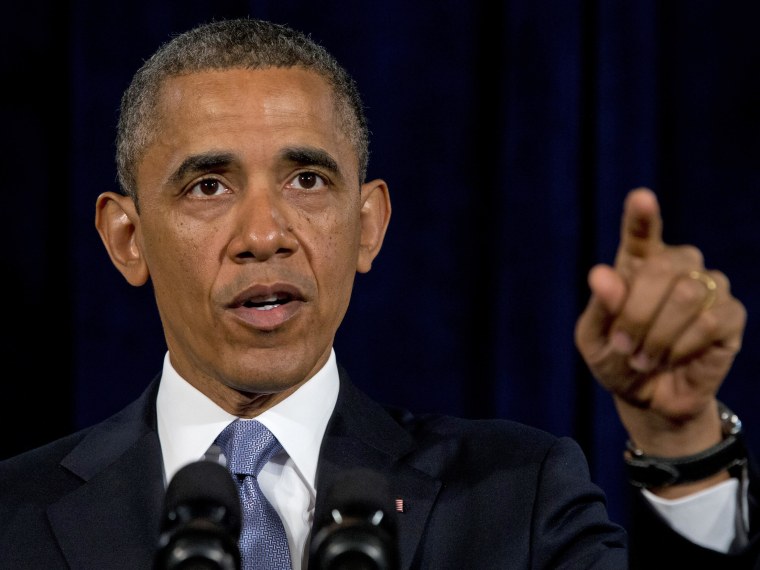President Obama roundly defended a government surveillance program on Friday, insisting it prevents terrorism, possesses sufficient oversight, and protects civil liberties.
“Nobody is listening to your telephone calls,” Obama said Friday after delivering a healthcare speech in San Jose, Calif. “What the intelligence community is doing is looking at phone numbers and durations of calls. They are not looking at people’s names and they’re not looking at content.”
Instead, Obama argued, officials are trying to find potential leads of those who may engage in terrorism.
The remarks are Obama's first following a report of a secret surveillance program that allows the National Security Agency (NSA) to obtain millions of Americans’ phone records. Under the court order, Verizon phone records must be turned over daily. It was granted on April 25 and goes into effect until July 19. It’s not clear if other phone carriers were mandated to hand over similar information. Obama said such reports about the program have been "hyped."
Late Thursday, the Washington Post also reported that the NSA and FBI also have a program called “PRISM,” which allows the government to tap “directly into the central servers of nine leading U.S. Internet companies” to extract audio, video chats, emails, photographs and more. That includes Microsoft, Yahoo, Google, Facebook, AOL, Apple, and more.
The president dismissed the notion that the phone program is secret. He argued it’s “secret in the sense that they are classified, but they’re not secret in the sense that when it comes to telephone calls, every member of Congress has been briefed by this program.”
He put the onus on Congress, saying “Your duly elected representatives have been consistently informed on exactly what we’ve been doing.” He said such programs have been approved by bipartisan majorities since 2006 and that if intel wants to listen in on the content of a phone call, they must go back to a federal judge, just like in a criminal investigation.
On PRISM, Obama said the program does not apply to American citizens or to anyone living in the country. “Not only is Congress fully apprised of it, but what is also true is that the [Foreign Intelligence Surveillance Act] court has to authorize it,” he added.
But civil liberties organizations have charged the Obama administration with overreaching in the name of security with organizations such as the ACLU charging the president with "the biggest surveillance scandal since the Bush administration’s warrantless wiretapping program."
A partisan divide blurred on security vs. privacy
A number of senators from both sides of the aisle have come out in support the program, insisting it has existed for years and has kept the country safe.
Republican Sen. Saxby Chambliss of Georgia said Thursday that the program contains “nothing particularly new. This has been going on for seven years under the auspices of the [Foreign Intelligence Surveillance Act] and every member of the United States Senate has been advised of this.”
Senate Intelligence Chair Dianne Feinstein of California, a Democrat, called the program “lawful” and agreed that Congress is aware of it.
“This is just meta data. There is no content involved. In other words, no content of a communication…The records can only be accessed under heighted standards,” Feinstein added. “It’s called protecting America.”
Republican Sen. Lindsey Graham went as far as to say he was “glad” the NSA was collecting phone records, telling Fox News that he was a Verizon customer and doesn’t mind if companies have to turn over data if it helps to weed out terrorists. People who have done nothing wrong have nothing to be concerned with, he insisted.
“We are very much under threat," the South Carolina lawmaker said. "Radical Islam is on the rise throughout the region. Homegrown terrorism is one of my biggest concerns. It is happening in our own backyard, and I’m glad that the NSA is trying to find out what terrorists are up to.”
Of course, not all lawmakers are defending the program, with many alarmed about privacy and civil liberties, and fear about unnecessary government overreach. Several–including independent Sen. Bernie Sanders of Vermont, Democratic Sens. Ron Wyden of Oregon and Al Franken of Minnesota, in addition to Republican Sens. Mike Lee, Rep. Jim Sensenbrenner of Wisconsin and more--have all reacted to the news with dismay at its broad scope.
The GOP's House Speaker John Boehner called on Obama to explain the surveillance, saying “I trust the president will explain to the American people why the administration considers this a critical tool.”
But Senate Majority Leader Harry Reid suggested the outrage was unwarranted. “Right now, I think everyone should just calm down and understand this isn’t anything that’s brand new,” he said.
While the details of this latest program are new, the snooping surveillance state undercurrents are not.
George W. Bush embarked on a controversial practice of warrantless wiretapping by the NSA following the Sept. 11 attacks. Today's Verizon case involves phone records—and not wiretapping—but raises the same concerns over the invasion of American citizens’ privacy.
Obama referenced Bush’s program during his remarks and took a hit at conservatives in a demonstration of how partisan lines have blurred on the issue of security vs. privacy.
“I think it’s interesting that there are some folks on the left, but also some folks on the right, who are now worried about it who weren’t very worried about it when a Republican was president,” Obama said.
The president said he welcomed debate about the program, insisting the country must strike a balance with keeping Americans safe while also meeting privacy concerns. He added, however, “You can’t have 100% security and also then have 100% privacy and zero inconvenience. We’re going to have to make some choices as a society.”
The existence of the surveillance programs were leaked shortly after the Obama administration was already under fire for the seizure of journalists’ phone records in probing who leaked classified information to the media.
